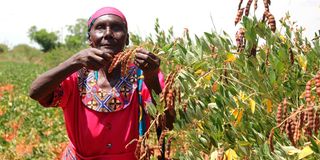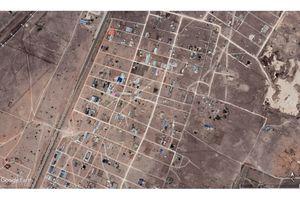42 years of silence: Jane Mulewa's journey from fistula shame to advocacy

Jane Mulewa, a 90-year old fistula survivor, harvests pigeon peas at Kitise village, Makueni County, on May 21, 2024. She has since become a fistula care champion.
What you need to know:
- Jane Mulewa, a 90-year-old woman from Makueni County, suffered from obstetric fistula for 42 years before finally receiving successful treatment in 2023.
- Her story highlights the widespread but often hidden problem of fistula in rural Kenya, where lack of awareness, stigma, and limited access to healthcare prevent many women from seeking help.
- Makueni County, in partnership with organisations, is now leading efforts to provide free fistula surgeries and raise awareness.
It’s about 10am on this sunny bright morning when we depart from Wote town, the capital of Makueni County, to Kitise village, about 70 kilometres away.
The road to Kitise village is well tarmacked and maintained. On both sides are vast tracts of land. Some maize plantations are nearing maturity. From the look of things, farmers here will get a bumper harvest.
The recent heavy rains seem to have done the trick here. On other pieces of land, cows and goats are grazing. Some farmers are busy tilling while others are weeding.
After driving for about 45 minutes, we branch from the highway to the road that leads to Kitise village.
We meet several donkeys pushing carts full of water jerrycans. The villagers here are going to look for water for their domestic and animal use. Water is usually a scarce commodity here.
The road is rough and we meander through the potholes for about 30 minutes to arrive at Jane Mulewa’s homestead.
"Welcome, welcome, welcome here at your mother’s home."
Mulewa’s homestead is simple. It is marked by two roomed mud-walled houses and a circular granary built using old timber. Inside it some dry maize hangs.
“Near the gate is a simple cowshed. The cows are in the field grazing,” Mulewa says, pointing to the cowshed.
On the far end adjacent to the compound is a well maintained garden. It has pigeon peas and black beans that are almost at the maturing stage. No doubt, Mulewa will experience a bumper harvest.
After a brief introduction, Mulewa hands us some plastic seats and leads us to a tree at the centre of the compound. We sit here to shield ourselves from the scorching sun.
Looking at Mulewa, 90, nothing can easily point to the pain and suffering she has endured for the last 42 years. She is such a jovial woman.
It is after having a conversation with her that we lift the lid on the pain and agony she has endured.
Perhaps her name Mulewa, which in Kikamba means the rejected one, has something to do with her predicament.
Mulewa recalls how in February 1982 she gave birth to a bouncing baby boy. He was her tenth child. She was filled with joy and thanksgiving for safely putting to term.
She delivered all her children at home, she says. After this delivery, Mulewa says all was fine initially before hell broke loose.
“Shortly after the birth of my lastborn son, I realised I was not able to hold my stool. I could not feel the stool coming out. I only realised after it was out. I did not know what was happening to me. I at first thought I had been bewitched,” Mulewa tells the Voice.
For over four decades, Mulewa could not understand what her problem was.
The agony of living with the condition was so harrowing and embarrassing. To keep off the stench that comes with the condition, she put on a lot of clothes.
Her countless visits to local health centres and hospitals, she reveals, did not yield any fruit as no illness was diagnosed.
Mulewa recalls that it reached a point that she thought she had HIV/Aids as it is the disease that she often heard did not have a cure.
For five times, Mulewa discloses going to different hospitals for an HIV test.
“I was convinced that I had HIV/Aids. All these visits to the hospital I carried my late husband with me. All those times, the tests turned out negative. In one of the hospitals they told me I had tapeworms, which were contributing to my problem,” she says.
Mulewa adds that after this, she resigned to fate and lived with the condition. However, her turning point came in March last year after she heard an announcement in the local radio station calling on women who were passing urine and stool without their knowledge to go to Makueni County and Referral Hospital for screening.
“At first I was hesitant. However, after a lot of soul-searching, I marshalled the courage and decided to go for the screening. When I went, I met young doctors who told me to remove my clothes. I refused as I could not imagine people the age of my children seeing my nakedness. They, however, told me that was the only way they would tell what my problem was. I agreed and was eventually diagnosed with fistula,” Mulewa recalls.
She tells this writer that after the reconstructive surgery to treat the fistula, she still could not believe she was healed and freed from shame.
“It took time to sink in that I was indeed healed. In Fact, I danced before the doctors in excitement. I could not believe my eyes that I could now go out and mingle with the other people. I was always staying alone at home all these years,” she notes.
And even though she got healed, Mulewa says she will never forget the pain she underwent at the hands of unforgiving society.
She lists stigma as one of the worst challenges. Being in a public place was the biggest nightmare for her, she says.
“I had no friends. Many people shunned me and always belittled me. I stopped going to church and chamas. I was always at home. It has been a lonely 42 years. I thank God that I had a supportive husband and children who understood my situation,” she regrets.
Due to the joy of getting healed, rejection and stigma for more than four decades, Mulewa is now a leading champion creating awareness of this curable condition in Makueni County.
She usually attends church and social gatherings, public barazas and other forums which she uses to sensitise women and girls to fistula.
“I am the happiest woman in the world since my dignity was restored. I thank the doctors who treated me. I always pray for them. It has been a joy for me that I was cured for my condition in my old sunset years before I die. For the remaining days of my life, I will continue to be a fistula ambassador sensitising women to the condition.”
Her story mirrors that of hundreds of other women in Makueni who have been lucky to have their dignity restored through free fistula surgery.
Makueni is one of the few devolved units that has introduced fistula care services at the County Referral Hospital in a joint initiative with Jhpiego, a non-governmental organisation affiliated with John Hopkins University.
According to Dr Doris Mbithi, an obstetrician gynecologist and fistula surgeon who heads the Makueni fistula care unit, hundreds of women have been screened this year, with more having undergone surgery to repair fistula at the centre since its inception in March last year.
During the fistula camp that took place at the Makueni County and Referral Hospital last month, 286 women were screened, with 85 of them undergoing reconstructive surgery.
Most affected
Data by the Ministry of Health shows that middle-aged women are the most affected by this humiliating condition.
According to Dr Hillary Mabeya, a renowned obstetric fistula surgeon, obstructed labour without access to timely medical treatment is one of the leading causes of fistula.
Dr Mabeya says 95 per cent of fistula cases are caused by obstructed labour, which also usually sees 70 per cent of the babies die in the process.
He also lists other causes to Caesarean Section surgery, where patients are accidently injured; cancers and sexual assaults; complications from pelvic surgery; and infection, among others are listed as major causes.
The medic says some of the signs of obstetric fistula, include leaking urine and stool without the knowledge of the patient.
He lists stigma as the biggest challenge that makes fistula not known or prevents women suffering from it from seeking help.
“Poverty and lack of information on the condition is also a major setback. We have few hospitals where fistula screening and treatment is done. I am appealing to doctors to also embrace specialisation in fistula surgery. This will help increase the number of fistula surgeons,” Dr Mabeya says.
He is calling for early and regular screening to detect and treat the condition early enough. Obstetric fistula is preventable; it can largely be avoided by delaying the age of first pregnancy, cessation of harmful practices and ensuring timely access to obstetric care.
Mr Anders Thomsen, the United Nations Fund for Population Activities (UNFPA) country director, says the condition is preventable, adding advocacy is needed to create more awareness.
Mr Thomsen is calling on women living with the condition to seek help even as he roots for preventive care. This, he notes, will be through women being referred to hospital without delays and ensuring expectant mothers give birth with the help of a professional birth attendant.
“UNFPA is committed to helping women living with fistula put a smile on their face by providing funding to fistula eradication campaigns. We will continue to support through provision of funds, technical assistance and supporting training for healthcare surgeons to fight the condition. There is also the need to enlighten the community to accept survivors since stigma has been the major undoing,” Dr Thomsen says.
He adds the need to enlighten the community to accept survivors which is paramount to their healing.
Makueni Health Executive Elizabeth Muli says the county government is focusing big on hospital deliveries as a way of nipping the fistula problem in the bud.
Ministry of Health data shows that about 3,000 women are diagnosed with fistulas every year and only 7.5 per cent of the women are able to access medical care.
This means that every year, more than 2,700 women with new fistula cases do not receive medical care.
The World Health Organisation (WHO) estimates that more than 2 million women live with fistula worldwide. Each year, between 50,000 and 100,000 new cases occur.
Surgeons
And with only about 10 fistula surgeons available in Kenya, access to care remains limited.
The Makueni fistula care programme started with the training of medics in fistula care. The team of 11 medics include anesthetists, nutritionists, counsellors, physiotherapists and general nurses.
It is meant to serve Ukambani and sections of the Coast that are underserved.
To make more doctors embrace fistula surgery, Dr Karen Aura, the fistula lead at the Reproductive and Maternal Health Division at the Ministry of Health, reveals they have developed a training package for surgeons who have interest in fistula care.
“Currently, we have only 10 fistula surgeons. We are training five others. We anticipate that by 2030, we will have routine care in fistula management in all our 47 counties,” says Dr Aura.
Jhpiego country director Paul Nyachae singles out cost as a key impediment to accessing fistula care since many of the women living with fistulas are not insured.
“The work of obstetric fistula is not just about the surgery. There is a lot more work that needs to be done such as counselling and the community efforts in reintegration. We hope stakeholders are able to join hands and work together to restore dignity to our women,” he notes.





